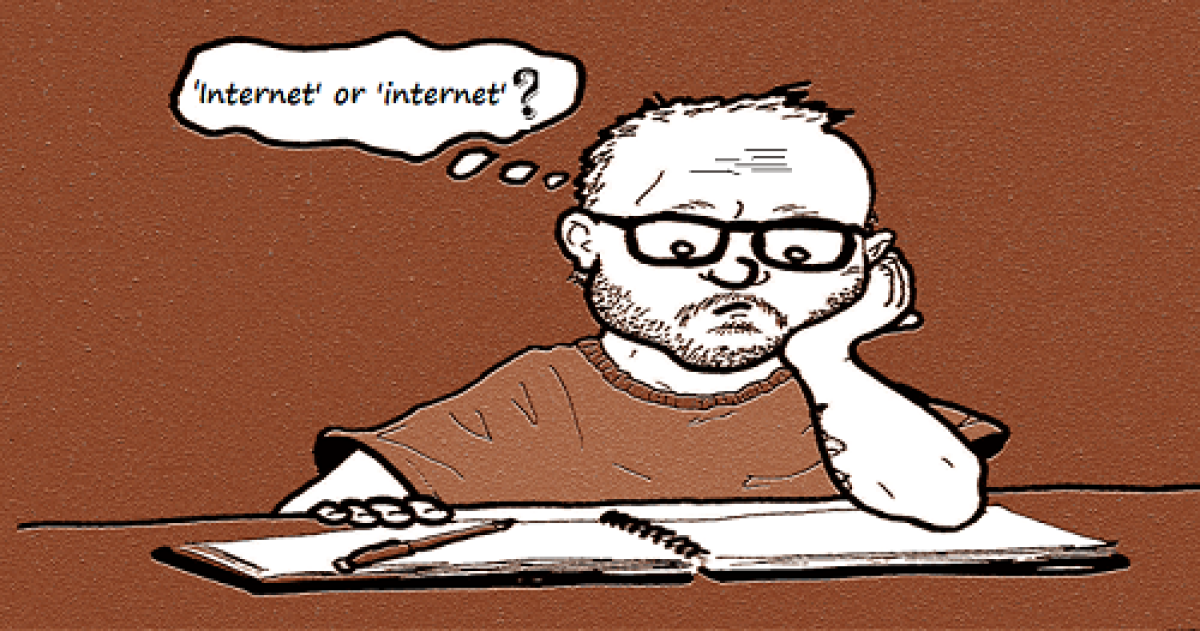AP Style Update: "Internet" and "Web" No Longer Capitalized

The Associated Press —purveyor of the AP Stylebook, used by journalists for the last century to standardize mass communications—has announced that in the 2016 edition of its AP Stylebook guide to English grammar and usage, the words "internet" and "web" will no longer be capitalized.
“The changes reflect a growing trend toward lowercasing both words, which have become generic terms,” AP Standards Editor Thomas Kent told Poynter.
So, if you are a writer, copy editor or grammar nerd, the jury is out at the AP: it is “web” and “internet,” not “Web” and “Internet.” The only problem is that the Chicago Manual of Style, another arbiter of American writing and citation styles disagrees – at least for now.
Chicago Stylebook hasn’t been updated and states the word “internet” should be capitalized.
Advocates for lowercasing welcome the AP changes
Long time advocates for lowercasing the words "internet" and "web” have welcomed the move by AP, suggesting it is long overdue. Lowercasing web won't be a stretch for Ben Zimmer, a Wall Street Journal columnist and executive editor of vocabulary.com and Visual Thesaurus, for example.
“It's become something a bit more generic in people's understanding,” he said.
Michael Calore, Gadget Lab editor, also says he feels vindicated by this move, given that his first journalism job was in 1995—a year when both words were “still foreign to most normals.” At the time, as is the case today, editors had power to ruthlessly change all of your copy from “internet” to “Internet.”
However, the original capitalization of the word “internet” is enshrined in the guidelines of respected news sources, such as the New York Times, the Washington Post, and the New Yorker. It is also enshrined in reputable style guides, such as the Associated Press, the American Psychological Association and the Chicago Manual of Style, and also in dictionaries, such as Webster's New World College Dictionary, according to a report on Wired magazine.
Wired.com itself used to lowercase internet, saying in its 2004 in-house style update that “there is no earthly reason to capitalize” the word. But, two years later the website was bought by Condé Nast that already owned Wired (the print magazine) and the site has been using "Internet" ever since.
“World Wide Web, or WWW is capitalized, as is Internet, so I capitalize the abbreviation, Web, since it is one of the three capitalized words in the proper compound noun, World Wide Web,” one language enthusiast justifies capitalization in one of the many online debates on the issue.
Nevertheless, newer digital news sources like Quartz, Buzzfeed and Gawker have been leading the way in not capitalizing the word “internet.” A powerful driver for this decapitalization has been avoiding the distraction brought by unnecessary capitalization of words.
These dissenting voices and the constant back-and-forth tug of war has resulted in widespread inconsistency in the spelling of both words online. So much so that major news sources like Wired.com have wavered in the past (and are likely to waver again) on the question of capitalization.
But now that the AP style editors seem to have recognized it is 2016 and announced their Stylebook will let us stop capitalizing “internet,” it may help bring more uniformity on the capitalization.
Why the AP Style update matters
If you are wondering why this AP style announcement matters, it’s because the AP Stylebook wields more influence over our modern language than nearly any other single entity.
Most print newspapers and professional digital publishers in the U.S. rely on it for their own copyediting, and even dictionaries keep a close eye on the changes the AP makes to each edition of its Stylebook. In fact, it was the AP Stylebook that prompted many dictionaries to change “e-mail” to “email,” and “Web site” to “website.”
Similarly, it was the AP that said “over” and “more than” can be used interchangeably and that “hopefully” – in the sense of ‘it is hoped that’ – can be used to begin a sentence, as well as stated that it was now style to spell out the names of states instead of abbreviating them. This has influenced the craft for many writers and journalists, and reflects an evolving language.
But dictionaries usually lag behind on reflecting these style changes. Dictionaries do not generally see themselves as making the rules, explains Jesse Sheidlower, who runs the American offices of the Oxford English Dictionary. “What dictionaries do is reflect what's out there,” he said.
He and other dictionary editors would think seriously about all these latest style changes after reputable newspapers make them, he added. So, until mainstream newspapers and digital publishers start changing their spelling, we’ll probably always reflect what style guides are saying.
The AP Stylebook changes will go into effect when the new print edition is published on June 1, 2016.










![9 Tips for Managing Your Online Writing Projects Efficiently [node:titile]](/sites/default/files/styles/video_thumbnail_bottom/public/open-book-laptop-online-writing-tips.jpeg?itok=rI4zR3a-)






![Can Pets Get Covid-19? How to Take Care of Your Pets During the Pandemic [node:title]](/sites/default/files/styles/video_thumbnail_bottom/public/dog-female-pet-owner-covid-care.jpg?itok=eLmbfN0W)
